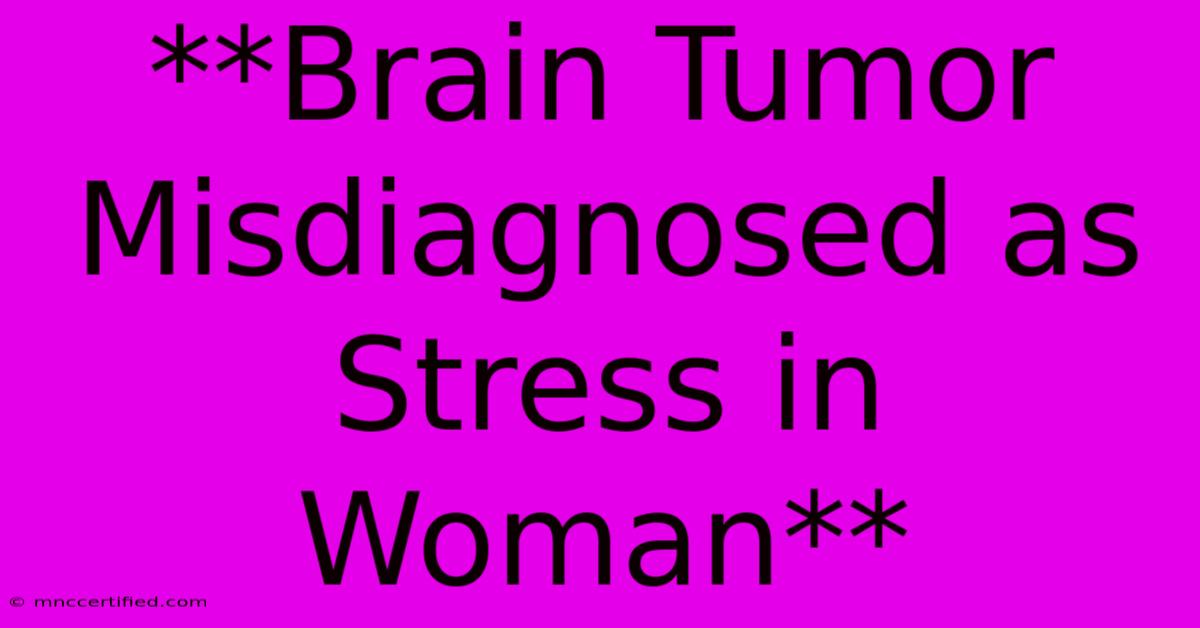**Brain Tumor Misdiagnosed As Stress In Woman**

Table of Contents
Brain Tumor Misdiagnosed as Stress in Woman: A Story of Misdiagnosis and Resilience
The human brain, a complex and intricate organ, often presents mysteries that even the most skilled medical professionals struggle to unravel. In a harrowing case that highlights the potential dangers of misdiagnosis, a woman's brain tumor was initially dismissed as stress, leading to a delayed and potentially life-altering diagnosis. This story serves as a stark reminder of the importance of persistent advocacy for one's health and the need for comprehensive medical evaluation.
A Growing Headache, Ignored Symptoms
The story begins with a woman, let's call her Sarah, experiencing persistent headaches. While headaches are a common ailment, Sarah's symptoms were severe and unrelenting. They interfered with her daily life, impacting her work, sleep, and overall well-being. Unfortunately, she initially sought medical attention from a general practitioner who attributed her symptoms to stress.
Stress is a common culprit behind headaches, but Sarah's case was far from ordinary. The headaches were accompanied by other troubling symptoms, including blurry vision, dizziness, and fatigue. Yet, these additional signs were also dismissed as stress-related, leading to a dangerous delay in proper diagnosis.
The Turning Point: A Second Opinion
Sarah's condition continued to worsen. Determined to find answers, she sought a second opinion from a neurologist. The neurologist, unlike the general practitioner, took a more comprehensive approach, ordering a brain scan. The results revealed the shocking truth: Sarah had a brain tumor.
The misdiagnosis had cost Sarah precious time, allowing the tumor to grow larger and potentially causing more damage. However, her resilience and persistence in seeking a second opinion ultimately saved her life.
Lessons Learned: Advocacy and Awareness
Sarah's story serves as a powerful reminder of the importance of patient advocacy and medical awareness.
Here are some key takeaways:
- Don't hesitate to seek a second opinion if you feel your concerns are being dismissed.
- Keep a detailed record of your symptoms, including frequency, severity, and any accompanying factors.
- Educate yourself about potential causes and symptoms of your ailment.
- Be persistent in advocating for yourself and your health.
Brain tumors are not always easily detectable, and symptoms can often be misdiagnosed. This underscores the importance of thorough medical evaluations, including imaging tests, when necessary.
The Importance of Early Diagnosis
Early detection of brain tumors is crucial. Prompt diagnosis and treatment can dramatically improve outcomes and increase the chances of a full recovery. Delaying treatment can lead to a more aggressive tumor, irreversible damage, and a higher risk of complications.
Moving Forward: Hope and Resilience
While Sarah's journey was challenging, she ultimately emerged stronger and more determined. Her story highlights the power of resilience in the face of adversity. It also underscores the importance of educating ourselves and advocating for our own health.
By sharing her story, Sarah hopes to raise awareness about the dangers of misdiagnosis and empower others to be their own health advocates.

Thank you for visiting our website wich cover about **Brain Tumor Misdiagnosed As Stress In Woman**. We hope the information provided has been useful to you. Feel free to contact us if you have any questions or need further assistance. See you next time and dont miss to bookmark.
Featured Posts
-
Duluth Trading Company Womens Jackets
Nov 09, 2024
-
Violence Erupts Israeli Fans Ambushed In Amsterdam
Nov 09, 2024
-
Dna Analysis Uncovers Pompeii Victim Identities
Nov 09, 2024
-
Leistikow Predicts Iowa Vs Ucla Outcome
Nov 09, 2024
-
How Much Does Akko Cell Insurance Cost
Nov 09, 2024